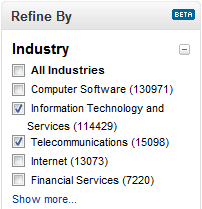 Do you ever use social networks to such as LinkedIn to search for people with experience in a specific industry?
Do you ever use social networks to such as LinkedIn to search for people with experience in a specific industry?
If you do, I can almost guarantee you that you are not finding everyone you’re looking for.
How?
There are intrinsic issues associated with any user generated content, especially when it comes to how users of social media identify themselves, and they can actually prevent you from finding the people you’re looking for.
Telecommunications Example
Let’s say you are looking for software engineers with Java development and telecommunications industry experience. On LinkedIn, it would be logical to select the “Telecommunications” under the industries option list.
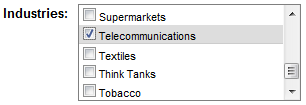
If you made this logical choice, you would get everyone who matches your keyword search and who selected “Telecommunications” on their LinkedIn profile.
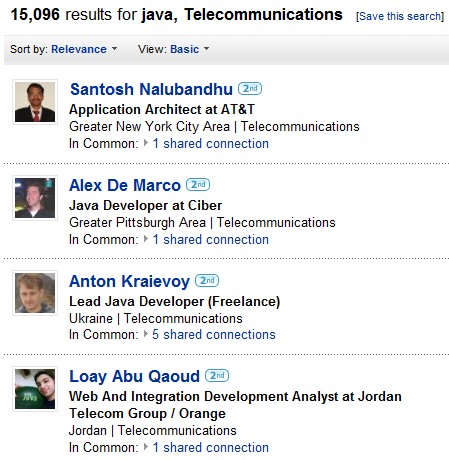
That’s great. But would you get everyone who actually had telecommunications industry experience?
No.
How do I know?
Let Me Show You
All you have to do is run a search for people who currently work for a major telecom company who mention Java, and then take a look at the industries they selected on their profiles. For my example, I’ll use Verizon.
This is what I got:
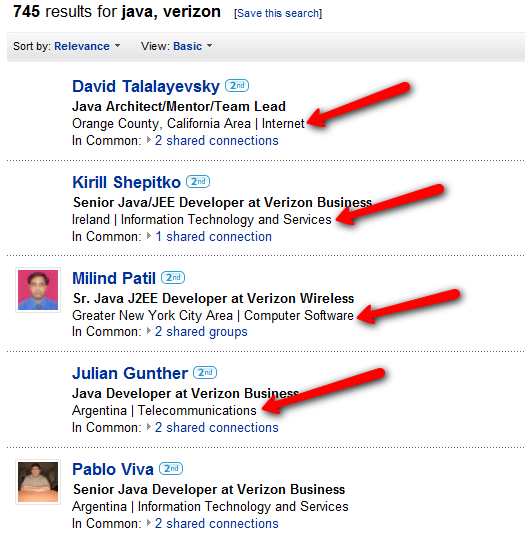
I see 4 different industries in the first 4 search results alone: Internet, Information Technology and Services, Computer Software, and Telecommunications.
And there’s more:
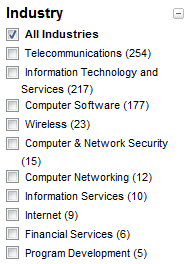
Looking at that industry list, we now know that if we wanted to use LinkedIn’s industry search option to find people who currently work at Verizon who mention Java on their LinkedIn profiles, we’d have to use the 10 different industries on the list above.
If you didn’t – and I would estimate about 99% of sourcers and recruiters don’t – you would miss 474 people who actually DO have telecommunications industry experience (current, even). In fact, you would assume those 474 people don’t exist, because you wouldn’t even be aware that your search prevented you from finding them. This is a perfect example of what I call a Hidden Talent Pool.
In this example, sourcers and recruiters would be missing over 50% of the total relevant results available!
Why Does This Happen?
It’s simple, really.
When people create or edit their LinkedIn profile, they choose an industry from the list that they feel most accurately identifies them.
So even if someone works as a software engineer for AT&T, they could choose to select “Internet” instead of “Telecommunications,” because they identify themselves as an Internet developer, rather than a telecommunications industry employee.
This phenomenon isn’t limited to telecommunications – it affects every industry.
Let’s Try Pharmaceuticals
If a sourcer or recruiter were looking for director-level marketing talent in the pharmaceutical industry and they searched for a current title of “director,” a keyword of “marketing,” and selected the “Pharmaceuticals” industry, they would find a lot of results – but they would most certainly not find everyone who fits the profile.
To illustrate this, let’s look for people who have worked for Pfizer, who have a current title of director, and who mention “marketing” in their profile. We can see 3 different industries in the first 4 results alone:
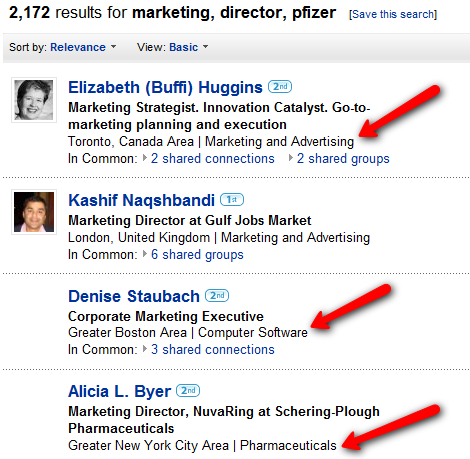
A sourcer or recruiter who relied on using the “Pharmaceuticals” industry selection to search for and find candidates would be missing at least 573 people who have worked for Pfizer, who have a title of “director” and mention marketing in their profile, because those 573 people selected an industry other than “Pharmaceuticals:”
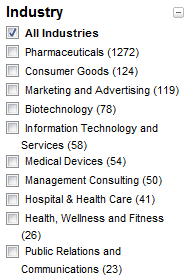
I stress at least because if you noticed in the telecom/Verizon example as well as the pharma/Pfizer example, when you click “show more” on the industries list, you see 11 total options: 1 saying “All Industries,” and 10 specific industries – and yet if you look closely at the totals in both examples I used, the numbers don’t add up.
I suspect that when you click “show more:”
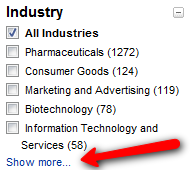
…LinkedIn only shows the top 10 industries in addition to “All Industries,” even when there are more than 10. I can’t state this as fact, but since the numbers don’t add up, I’ll chalk it up to an educated assumption. Only LinkedIn could actually confirm or deny.
The Heart of the Issue
50% of the issue at work here is that many people have experience working in multiple industries, yet they can only select one on their LinkedIn profile.
If you’re looking for someone with “Defense & Space” industry experience on LinkedIn, you cannot find the people who have significant Defense and Space Industry experience who currently work in another industry, and happen to have selected that current industry on their LinkedIn profile.
The other 50% comes from the fact that people can and will identify themselves in any way they want to – which may have nothing to do with the way YOU would identify or label them.
A marketing professional working for a pharmaceutical company can just as easily think of themselves in the “Consumer Goods” industry when making the selection on their LinkedIn profile.
Final Thoughts
I hope that what I’ve shown you so far has your mind racing, thinking about all of the candidates you’re missing when you use LinkedIn’s industry search option.
If you think you’re not affected by this issue, think again.
This is not limited to any industry, skillset, or even a particular social network – Twitter and Facebook are even worse!
Anything above Level 1 Sourcing is 99% thinking, 1% syntax. Electronic talent identification requires curiosity, creativity, interpretive ability, and analytical thought – 4 things that Dr. Michio Kaku believes cannot be achieved with artificial intelligence.
I happen to agree.
So if you’re good at these things – creative thought, being curious and analytical, and you’re able to think outside of the box – you can feel confident you won’t be replaced by a matching application any time in the near future.
Happy hunting!